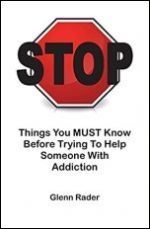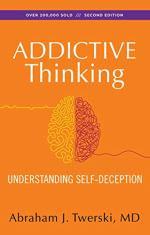This post was originally published on this site
by Glenn Rader
When I was about eight years old, my mother was overcome by delusional, paranoid schizophrenia. She was a bright woman, always sharply dressed, articulate, loving, and caring. The schizophrenia completely consumed her, and she became an obsessive, brooding, and fearful person. Her change was not simply like someone who is having a really bad day and being disagreeable and moody. She was completely transformed into a different person. It was as if someone else had been transplanted into her body. Her voice, mannerisms, and her view of reality were completely altered.
My mother believed that she was a part of a dark conspiracy. Her role in the “plot” was to protect secret, important information that a group of unsavory characters wanted. Her charter from her “leaders” was to stay hidden and protect that information. Periodically, she would direct me and my sisters to hide in closets or in the basement to avoid the “radar” beams that they were using to scan our house in an attempt to locate her. She was delusional, it was her reality, and there was nothing you could say to her to convince her otherwise. On a positive note, she found a path out of her mental illness and lived a great life, free from schizophrenia, until she passed away at 98 years old. My sisters and I had a wonderful relationship with her.
My drinking and drugging started when I was in undergraduate college and was nurtured during graduate school. I first started thinking that I might have an alcohol “issue” when, after expressing some remorse over my vodka bottle on the shelf being nearly empty, my roommate suggested that my concern over my vodka supply seemed “odd”. He went on to say that I might be developing a problem with drinking. Of course, that was a preposterous assertion. Over decades my “issue” with alcohol progressed into a full physical and psychological dependency. Along with the dependency came the “stinking thinking”. I can recall my wife telling me that I seemed like a different person; that my personality had changed, and that most of the time I was not making sense – not being realistic. I was delusional, it was my reality, and there was nothing you could say to convince me otherwise.
My “stinking thinking”, my “alco-logic” as we like to refer to it in my local AA recovery community, led me to the conclusion that I might have inherited my mother’s mental illness. Perhaps, my personality and behavior change, and excessive “self-medicating” with alcohol and drugs to cope, were a result of developing schizophrenia. I went to a psychiatrist and had the full battery of psychological tests performed. Alco-Logic: If I could address the mental illness, then I could drink (and drug) like “normal” people – not needing the “extra” for self-medication. Fortunately, I got a clean bill-of-mental-health from the psychiatrist. Shortly thereafter I got active in AA and have developed a solid recovery regimen.
Then, to my amazement, a few years into recovery I discovered a short, insightful book that is now on my list of “must-read” books for people in recovery. It is called Addictive Thinking – Understanding Self-Deception, by Abraham, J. Twerski, MD. It is a book that explains the similarities between the thinking that accompanies addiction and schizophrenia.
Dr. Twerski is the founder and medical director emeritus of the Gateway Rehabilitation Center in Pittsburgh, Pennsylvania. A rabbi, psychiatrist, and chemical dependency counselor, he is the author of numerous journal articles and books.
Based on his extensive, hands-on experience in the addiction recovery field, and his training in psychiatry, Dr. Twerski observed that people suffering from addiction reach a stage where they think and behave like schizophrenics. What does he mean by “thinking like a schizophrenic”? He means that you can reach a stage in your addiction where you believe and behave like you are living in an alternative reality. Looking back, I may not have inherited my mother’s mental illness, but I was certainly thinking and behaving like I was living in a different reality.
What Dr. Twerski would advance is that both the alcoholic and the schizophrenic are living in extreme self-deception. It is self-deception that is grounded in self-esteem issues. Reading Addictive Thinking was like reading a summary of myself when I was at the height of my addiction. These are some of the “stinking thinking” issues that are part of the self-deception that Dr. Twerski describes:
- Confusion regarding cause and effect,
- Denial, rationalization, and projection,
- Problems dealing with conflict,
- Hypersensitivity,
- Having morbid expectations,
- Manipulating others,
- Guilt and shame,
- Omnipotence and impotence,
- An inability to admit errors, and
- Anger management.
Through Dr. Twerski’s work, I have an improved understanding of my addiction, delusional thinking, and why I must rely on resources outside of myself for guidance regarding my recovery. He is someone who has been in the “trenches” of addiction and psychiatry and knows his way around.
 Addictive Thinking – Understanding Self-Deception.
Addictive Thinking – Understanding Self-Deception.
Dr. Twerski outlines the destructive and terrifying illogic that marries a person with a substance use disorder to their addiction. “Stinking thinking” and irrational thought are byproducts of addiction and they only worsen with time.
Twerski, with a deep psychological understanding, steps in to explain and contextualize all of the actions that arise from addictive thinking.
 Glenn Rader is an author and public speaker in the recovery community. He is the author of: STOP – Things You MUST Know Before Trying to Help Someone with Addiction.
Glenn Rader is an author and public speaker in the recovery community. He is the author of: STOP – Things You MUST Know Before Trying to Help Someone with Addiction.
STOP is a short, innovative book that is essential reading for someone trying to help a person with alcohol or drug addiction. The book contains information and action items that some people take years of trial and error to learn; often at a significant emotional and financial sacrifice.
The book will change your view of what “helping” someone struggling with addiction really means.
The post Addictive Thinking – Thinking Like a Schizophrenic first appeared on AA Agnostica.
